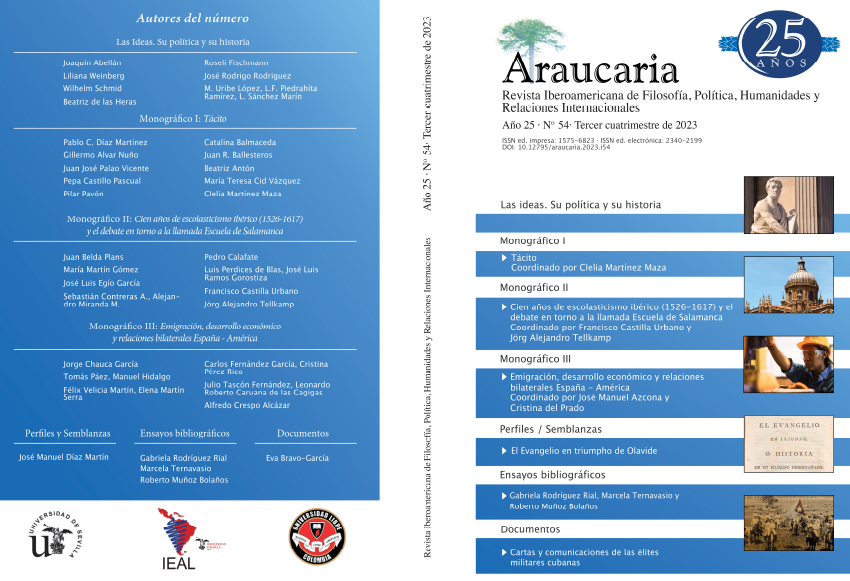Germánico en Egipto (Tac. ann. 2.60-61)
Tácito, Heródoto y la escenografía de la certeza en la historiografía antigua
DOI:
https://doi.org/10.12795/i54.15Palabras clave:
Germánico, Egipto, Tácito, Heródoto, Certeza históricaResumen
El texto propone una nueva interpretación para la descripción que realiza Tácito (Ann. 2.60-61) del viaje por Egipto de Germánico (19 d. C.). El autor establece paralelos de este texto con las Historias de Heródoto para definir una intención teórica en el mismo. Tácito utiliza este episodio egipcio para reflexionar sobre los métodos y las posibilidades de alcanzar certezas por medio del discurso histórico.
Descargas
Citas
Baragwanath, E., Motivation and Narrative in Herodotus (Oxford, Oxford University Press, 2008).
Baldwin, B. “The Authorship of the “Aratus” Ascribed to Germanicus”, Quaderni Urbinati di Cultura Classica, 7 (1981), pp. 163-172.
Blonce, C., Anne Gangloff, “Mémoire du voyage de Germanicus en Orient”, Cahiers du Centre Gustave Glotz, 24 (2013), pp. 113-134.
Brown, T.S., “Herodotus Speculates about Egypt”, The American Journal of Philology, 86.1 (1965), pp. 60-76.
Caballos, A., Eck, W., Fernández, F., El senadoconsulto de Gneo Pisón Padre (Sevilla, Universidad de Sevilla-Fundación El Monte-Consejería de Cultura Junta de Andalucía, 1996).
Canfora, L., La storiografia greca (Milán, Edizioni Bruno Mondadori, 1999).
Cortés Copete, J.M., “El Coloso de Amenoph. Adriano, Balbila y Pausanias en Egipto” [en D. Pérez Sánchez, M. Rodríguez Gervás, J. R. Carbó García, I. Pérez Miranda, eds.: Poder y heterodoxia en el mundo greco-romano. Estudios en homenaje a la profesora M.ª José Hidalgo de la Vega, Salamanca, Ediciones Universidad de Salamanca, 2017], pp. 189-208.
Fehling, D., Die Quellenangaben bie Herodot (Berlín-Nueva York, Walter de Gruyter, 1971).
Girdvainyté, L., “Egypt in Roman Imperial Literature: Tacitus’ Ann. 2.59-61”, Literatüra, 57.3, (2015), pp. 84-97.
González, J., “S. C. de honoribus Germanici decernendis. Tabula Siarensis (TS) y Tabula Perusina (TPG)” [en J. González Fernández, J. Bermejo Meléndez, eds.: Germanicus Caesar. Entre la Historia y la leyenda, Huelva, UHU.es publicaciones/Onoba monografías, 2020], pp. 271-330.
Gruen, E.S, Culture and National Identity in Republican Rome (Londres, Duckworth, 1993).
Haywood, J., “The Use(s) of Inscriptions in Herodotus’ Histories”, The American Journal of Philology, 142.2 (2021), pp. 217-257.
Hevbner, H., (ed.), P. Cornelius Tacitus, Annales, (Stuttgart-Leipzig, In Aedibus B. G. Teubneri, 1994).
Wybergh How, W., Joseph Wells, A Commentary on Herodotus (Oxford, Oxford University Press, 1923).
Kelly B., “Tacitus, Germanicus and the Kings of Egypt (Tac. Ann. 2.59-61)”, The Classical Quarterly, 60.1 (2010), pp. 221-237.
Koestermann, E., “Die Mission des Germanicus mi Orient”, Historia: Zeitschrift für Alte Geschichte, 7 (1958), pp. 331-375.
Lebek, W.D., “Der Proconsulat des Germanicus und die Auctoritas des Senats: Tab. Siar. Frg. I 22-24”, en Zeitschrift für Papyrologie und Epigraphik, 87 (1991), pp. 103-124.
Lesky, A., Historia de la literatura griega Barcelona, RBA, 2005 [=Editorial Gredos, Madrid, 1989, orig. alemán 1963]).
Levick, B., Tiberius the Politician (Londres-Nueva York, Routledge, 1976).
López de Juan , C., (trad. cast., prólog. y not.), Cornelio Tácito. Anales (Madrid, Alianza Editorial, 1993).
Low, K., “Germanicus on Tour: History, Diplomacy and the Promotion of a Dynasty”, The Classical Quarterly, 66.1 (2016), pp. 222-238.
Luke, T., “Egypt and the secret of Empire in Tacitus’ Histories” [en Miguel John Verluys, Kristine Bülow Clausen y G Capriotti Vittozzi, eds.: The Iseum Campense from the Roman Empire to the Modern Age, Temple-Monument-Lieu de Mémoire. Proceesings of the International Conference Held in Rome at the Royal Netherlands Institute in Rome (KNIR), the Accademia di Dinamarca, and the Accademia d’Egitto (May 25-27 2016), Roma, Edizioni Quasar, 2018], pp. 193-210.
O’Gorman, E., Irony and Misreading in the Annals of Tacitus (Cambridge, Cambridge University Press, 2000).
Pagán, V.E., Tacitus (Londres-Nueva York, I. B. Tauris, 2017).
Priestley, J., Herodotus and Hellenistic Culture. Literary Studies in the Reception of the Histories (Oxford, Oxford University Press, 2014).
Rivière, Y., Germanicus. Prince romain. 15 av. J.-C.-19 apr. J.C., (París, Perrin biographie, 2016).
Ruiz-Gutiérrez, A., “Visita cultural o demostración de poder: el controvertido viaje de Germánico a Egipto” [en J. González Fernández, J. Bermejo Meléndez, eds.: Germanicus Caesar. Entre la Historia y la leyenda, Huelva, UHU.es publicaciones/Onoba monografías, 2020], pp. 59-78.
Saylor, D., Writing and Empire in Tacitus (Cambridge, Cambridge University Press, 2008).
Seager, R., Tiberius (Worcester-Londres, Eyre Metuen, 1972).
Shotter, D.C.A., “Tiberius and Germanicus”, Historia: Zeitschrift für Alte Geschichte, 17 (1968), pp. 194-214.
Syme, R., Tacitus, 2 vols. (Oxford, Oxford University Press, 1958).
Weingärtner, D.G., Die Ägyptenreisen des Germanicus (Bonn, Rudolph Habelt Verlag, 1969).
Williams, K.F., “Tacitus’ Germanicus and the Principate”, Latomus, 68.1 (2009), pp. 117-130.
Woodman, A. J. , “Tacitus and Germanicus: Monuments and Models” [en R. Ash, J. Mossman, F. B. Titchener, eds.: Fame and Infamy: Essays for Christopher Pelling on Characterization in Greek and Roman Biography and Historiography, Oxford, Oxford University Press, 2015], pp. 254-268.
Woods, D., “Tacitus on the Visit of Germanicus to Egypt”, Mnemosyne, 75.6 (2021), pp. 982-995.
Descargas
Publicado
Cómo citar
Número
Sección
Licencia
Las ediciones impresa y electrónica de esta Revista son editadas por el Secretariado de Publicaciones de la Universidad de Sevilla, siendo necesario citar la procedencia en cualquier reproducción parcial o total.Salvo indicación contraria, todos los contenidos de la edición electrónica se distribuyen bajo una licencia de uso y distribución “Creative Commons Atribución-NoComercial-SinDerivar 4.0 Internacional”








